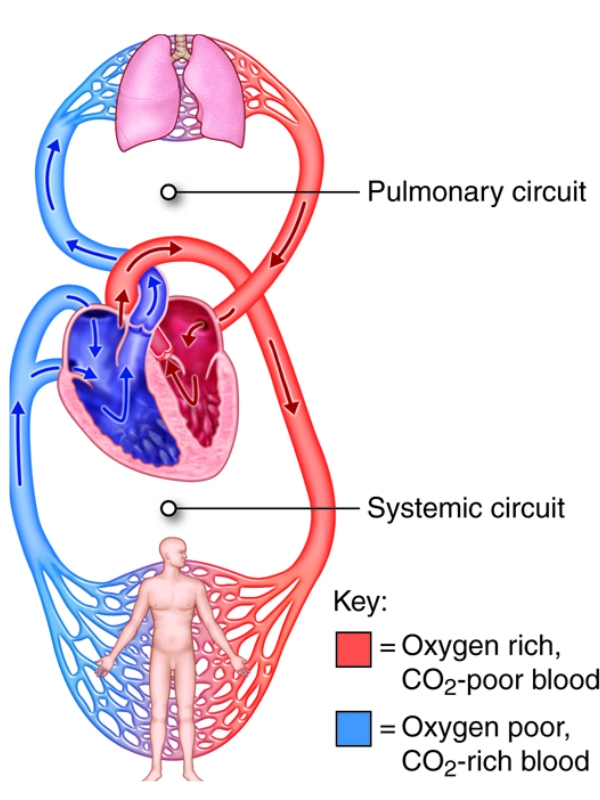Wishing everyone a safe and happy Christmas and New Year – Meri Kirihimete from the Healthify team.
Pulmonary hypertension
Key points about pulmonary hypertension
- Pulmonary hypertension is high blood pressure in the lungs.
- It can affect people of all ages, including children, and its occurrence increases with age.
- Pulmonary hypertension is more common among women, older adults and people who have another heart or lung condition.
- Although there's no cure for pulmonary hypertension, treatment can control the symptoms.

Pulmonary hypertension is high blood pressure in the arteries going from the right side of your heart to your lungs (pulmonary arteries).
These arteries normally carry oxygen-poor blood to the lungs where oxygen is added. The blood is then returned to the left side of the heart where it is sent throughout the body to deliver that oxygen.

Image credit: Anatomy & Physiology, Cenveo via Wikimedia Commons
Pulmonary hypertension affects the right side of your heart and is a serious condition that makes your heart work harder than normal to pump blood into your lungs. If left untreated, pulmonary hypertension can lead to enlargement and weakness of your heart, or heart failure.
It can affect people of all ages, including children, and its occurrence increases with age. There are many causes of pulmonary hypertension, although it's more common in people who have another heart or lung condition. Rarely, the cause of pulmonary hypertension is unknown. In this case, the condition is called idiopathic pulmonary arterial hypertension (IPAH). Idiopathic means the cause of a disease is not known. IPAH affects more women than men.
Symptoms of pulmonary hypertension are sometimes hard to recognize. This is because many are the same as the symptoms of other medical conditions. People usually have symptoms for some time before being diagnosed. Some symptoms of pulmonary hypertension include:
- shortness of breath
- coughing that is dry or produces blood (though coughing up blood has many causes and should be checked out right away)
- chest pain
- fatigue or tiredness
- wheezing (a whistling sound when you breathe out)
- dizziness that may lead to fainting
- weakness
- nausea and vomiting
- swelling of your abdomen (tummy, puku), legs or feet.
Symptoms can get worse over time. For example, in the early stages of pulmonary hypertension, you may only have shortness of breath with exercise. As the disease progresses, shortness of breath will occur more often, along with increasing fatigue, being unable to exercise, and swelling in your tummy or legs.
Pulmonary hypertension is caused by changes to your pulmonary arteries (the blood vessels that carry blood from the heart to the lungs) or conditions that cause an increase in pressure inside these vessels.
Pulmonary hypertension can have a number of different causes:
- Various diseases that cause problems with the smaller branches of the pulmonary arteries. This is called pulmonary arterial hypertension or PAH.
- Conditions that affect the left side of the heart such as left heart failure or left-sided heart valve disease, eg, mitral valve or aortic valve disease.
- Lung diseases or a shortage of oxygen in the body (hypoxia) as a result of conditions like COPD, sleep apnoea, pulmonary fibrosis, or long-term exposure to high altitudes in people who may be at higher risk of pulmonary hypertension.
- Narrowing or a blockage in the pulmonary arteries as a result of blood clots or tumours.
Pulmonary hypertension can be difficult to diagnose because it has similar symptoms to other more common conditions.
If your healthcare provider thinks you could have pulmonary hypertension, they may order a series of initial tests to rule out other conditions before referring you to a specialist. These tests include an echocardiogram (ultrasound of your heart), blood tests, chest X-rays, an electrocardiogram (ECG), and pulmonary function (breathing) tests.
A specialist may carry out further tests (eg, exercise tolerance tests, CT scanning/imaging, ventilation/perfusion lung scan, and right heart catheterization) to make a diagnosis.
Treatment for pulmonary hypertension will usually depend on the cause of the condition. Sometimes treating the disease causing the pulmonary hypertension will help a lot. Pulmonary hypertension can't be cured, but treatment can reduce the symptoms and help you manage your condition.
Pulmonary hypertension often gets worse over time. If it's not treated it may cause heart failure, which can be fatal, so it's important treatment is started as soon as possible.
If another condition is causing pulmonary hypertension, the underlying condition should be treated first. This can sometimes prevent the pulmonary arteries being permanently damaged.
Medicines
Examples of medicines used to treat pulmonary hypertension include:
- Medicines to relax or widen blood vessels and lower blood pressure in the pulmonary arteries. These are most often prescribed if you have pulmonary arterial hypertension. These medicines may include:
- calcium channel blockers (CCBs) (eg, nifedipine and diltiazem)
- endothelin receptor antagonists (eg, bosentan and ambrisentan)
- phosphodiesterase type 5 inhibitors (eg, sildenafil and tadalafil, both of which may be used to treat some erection problems)
- prostacyclin pathway agionists (eg, eopopostenol and iloprost)
- a combination of some of these.
- Anticoagulants may be given to people whose pulmonary hypertension is caused by chronic blood clots in the lungs.
Other treatment options
Your healthcare provider may recommend a procedure, surgery, or therapy to treat pulmonary hypertension.
Possible procedures are:
- Oxygen therapy if the oxygen levels in your blood are too low.
- Balloon atrial septostomy to decrease pressure in the right heart chambers and improve the output of the left heart and oxygenation of the blood. In this procedure, a small hole is made in the wall between the right and left atrium to allow blood to flow from the right to the left atrium.
- Pulmonary endarterectomy surgery to remove blood clots from the inside of the blood vessels of your lungs.
- Balloon pulmonary angioplasty to lower the blood pressure in your pulmonary artery and improve heart function if you are unable to have a pulmonary endarterectomy.
- A lung transplant may be considered for younger, otherwise healthy people with severe or quickly worsening symptoms which haven't responded to other treatments.
Each person's situation will be different depending on many factors, including how good or bad your condition is at the time of diagnosis and how you respond to treatments.
If you have pulmonary hypertension it's important to:
- continue to exercise if you can manage it
- avoid or quit smoking (or vaping)
- get recommended vaccinations (eg, the yearly flu vaccine)
- see your healthcare provider regularly.
Pulmonary hypertension is a disease that often gets worse and can be fatal, but treatments can able you to live fuller and healthier lives.
What Is pulmonary hypertension?(external link) American Thoracic Society
Resources
Patient support groups(external link) Pulmonary Hypertension Society of Australia and New Zealand
Living with pulmonary arterial hypertension(external link) Lung Foundation Australia
References
- Pulmonary hypertension(external link) NHS Choices, UK
- Pulmonary hypertension(external link) CDC, US
- Clinical features and diagnosis or pulmonary hypertension of unclear aetiology in adults(external link) UpToDate, US, 2023
- Treatment and prognosis of arteria hypertension in adults (group 1)(external link) UpToDate, US, 2023
- Decision for pulmonary arterial hypertension (PAH) treatments(external link) Pharmac, NZ, 2023
- (external link)Humbart M, Kovacs G, Hoper MM, et al. 2022 ESC/ERS Guidelines for the diagnosis and treatment of pulmonary hypertension – d(external link)eveloped by the task force for the diagnosis and treatment of pulmonary hypertension of the European Society of Cardiology (ESC) and the European Respiratory Society (ERS). Endorsed by the International Society for Heart and Lung Transplantation (ISHLT) and the European Reference Network on rare respiratory diseases (ERN-LUNG)(external link) Eur Heart J;43(38):3618-3731
- Naing P, Kangaharan N, et al. Pulmonary hypertension in remote and disadvantaged population – overcoming unique challenges for improved outcomes(external link) RACP Internal Med J;53(1):12-20. (external link)
Credits: Healthify editorial team. Healthify is brought to you by Health Navigator Charitable Trust.
Reviewed by: Dr Art Nahill, Consultant General Physician and Clinical Educator.
Last reviewed:





